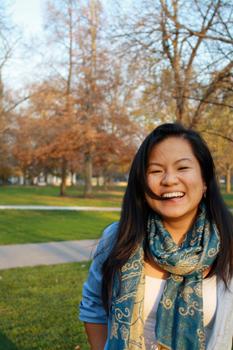The Path to Equity

Funding through the Paul and Daisy Soros Fellowship for New Americans will help Giovania Tiarachristie '13 realize a long-held dream: to help build just, equitable communities that meet the needs of underserved residents. Photo by Carl Socolow '77.
by MaryAlice Bitts-Jackson
In her nearly four years on campus, Giovania Tiarachristie ’13 has worked ardently to uncover root causes of social injustice and other community ills. After she graduates in May, she plans to help solve some of those problems at the structural level, with help from a substantial grant from a national charitable trust.
As one of only 30 young scholars awarded the Paul & Daisy Soros Fellowship for New Americans in 2013, Tiarachristie will receive $25,000 in living expenses and up to $20,000 in support for each year of graduate study. The funds will help realize a life mission for this sociology major and community volunteer—one that she is able to view through the lens of social science and from the inside out, having grown up in an immigrant family that struggled financially to gain a foothold in a new country.
Seizing opportunities
Born in Indonesia to ethnically Chinese parents, Tiarachristie moved to Pittsburgh with her family at age 10. She says that socioeconomic struggles throughout her childhood taught her an important early lesson: that success “is not the degree, title or status you may hold, but rather, how you seize the unrealized opportunities before you, no matter your position in society.”
Tiarachristie proved her commitment to that ethos at Dickinson, joining numerous campus organizations relating to environmental and social-justice issues. Most notably, Tiarachristie co-founded the Dickinson Idea Fund, a student-run incubator and revolving-loan program that gives students the resources they need to solve community problems, and she serves as its executive director in her senior year. She also was named a 2013 Baird Fellow candidate, an honor bestowed by the college to recognize students who have advanced sustainability goals on or beyond the Dickinson campus through excellence in scholarship and service.
Tiarachristie infused her studies with the same passion and welcomed opportunities for hands-on learning experiences. She learned about urban planning and sustainability as a study-broad student in São Paulo, Brazil; took a seminar investigating the social impact of fracking in Bradford County, Pa.; and co-developed an independent-study course on racial politics and food justice in a low-income neighborhood in Pennsylvania's capital. Tiarachristie also learned about sustainable agriculture by working as a student intern at the Dickinson College Farm and augmented her sociology coursework with a minor in Portuguese and Brazilian studies.
Fresh perspective
Together, Tiarachristie says, these formal and informal educational experiences opened her eyes to the ways in which city and community designs can contribute to or alleviate inequity and suffering.
“There's so much potential to decrease inequality through urban planning,” she explains, “but a lot of planners are trained to revitalize communities to meet the need of the capitalist economic and political system we live in and end up perpetuating the inequalities by failing to understand the real needs of the community as told by the residents themselves."
This problem is compounded by professionals in the planning and design field who have limited or no direct experience with communities most in need. “I've noticed that sometimes, the developers and planners speak a whole different language than the residents they serve,” Tiarachristie says.
Moving toward justice
Tiarachristie plans to work directly with marginalized residents to increase engagement and help them to acquire the skills and support needed to spark positive change. And eventually, she hopes to help engage professionals with diverse backgrounds in the field and work toward incorporating cultural immersion and competency into urban-planning curricula.
But first, she must earn her graduate degree.After considering several options, she's decided to pursue an M.S. in city and regional planning at the Pratt Institute in Brooklyn, N.Y. "It was one of the most difficult decisions I have ever made, yet I trust that it is the right one," she says, explaining that she'll work as part of the diversity committee at the Pratt Center for Community Development, and as a graduate assistant for a studio class that will take her to Sao Paulo, Brazil.
She says she can’t wait to get started, and she’s grateful for the fellowship that will make her continued education possible.
“Besides the funding for grad school and living expenses, I'm incredibly grateful to be a part of a community that celebrates this country's foundation of immigrants,” she says. “This enables me to feel proud of my family and where I come from—something I struggled with, growing up—and gives me and opportunity to thank all of the individuals who have supported and cared for me throughout my journey, including community members who shared their personal stories and struggles with me.”
Published March 29, 2013